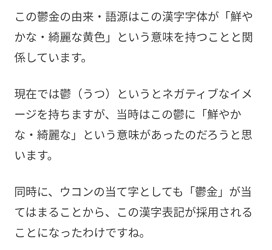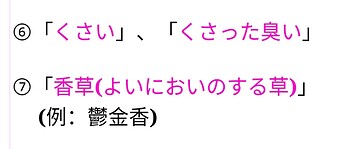This is going to be quite a long read so tl;dr at the bottom.
So I’m an ALT, and earlier I was talking to the English teacher after a lesson. He was asking me about my kanji studies and he asked me what my favourite kanji was. I said I really liked 桜, which is quite typical, it’s a very nice kanji. But I also jokingly said I liked 鬱. Naturally he was surprised, so he googled the kanji on his PC to check if I meant that one. The conversation ended and I got back to my reviews before another teacher walked over and saw the google search. She got curious and asked about it, and one thing led to another and she ended up saying that 鬱 was used in the non-gairaigo word for turmeric.
In the time I’ve been in Japan, I’ve only ever seen turmeric as ターメリック in Japanese, but apparently it is known natively as うこん, which is usually written as 鬱金. Pretty interesting, but nothing ground breaking right? Well, I got curious and I wanted to know why turmeric is “gloomy gold”, because if you’ve ever seen turmeric, that’s not very accurate. So I looked it up, which led me to this:
So for ウコン, it was originally ウッコン and it came from Chinese (if I’m interpreting this correctly). But for the kanji component, 鬱金 apparently means “a vivid(/fresh/etc.) yellow”. That makes more sense- wait, why does that come from 鬱??? That kanji means gloom/melancholy, that’s the complete opposite feeling!
Here’s another resource. This says that 鬱 used to have a meaning of “vivid”, or “pretty”.
I no longer care about turmeric, I now have to know why 鬱 is apparently living a double life. So I google the etymology of 鬱, and I find this article, with the many definitions of 鬱 and the kanji composition history:
In particular, these two definitions stick out and match up with the history. “A nice grass smell”, “an enveloping (good) smell”. Admittedly the history composition bit goes over my head a little, but talk of trees covering the land and grains seems to be along the right track, so how does that get to “gloomy”?
Well, one of the definitions listed for 鬱 is ふさぐ:
鬱 has this listed as a reading on jisho, which you can look up (鬱ぐ). This means “to feel depressed”/“to be in low spirits”/“to mope”. All matching the meaning we know, but completely unrelated to its history. Well, if you type out ふさぐ, you may get a suggestion on your IME. 塞ぐ has the same reading, but a different meaning. That being “to close”/“to block”/"to “obstruct”/“to fill up”/etc., But also “to feel depressed”. So apparently there’s a connection between these two meanings, and I think I’ve cracked it. Although I have to say to anyone still reading, my Japanese isn’t perfect and neither is my googling. The actual origin could be as clear as day somewhere and I just missed it. This is all conjecture.
So, originally the kanji had the meaning of “an enveloping good smell”. I think this matches up with the “to fill up” definition pretty well. The good smell (of grass) is filling up the air, obstructing other smells. Thus, the kanji came to be associated with blocking. Then eventually through some means, this came to be used in the definitions 気がはればれしない, and 気がふさぐ, I’m assuming because if something is blocking things in your mind/soul, then it will not be clear, thus you have a foggy feeling. And finally, that association links to the feeling of melancholy, or gloominess, when everything is foggy and dark in your mind.
Of course like I said, this is all conjecture and there’s a good chance I’m very wrong. I didn’t even touch on the many other definitions of 鬱, or even the fact that there’s a simplified version of the kanji, 欝. If you read all of this, I’m very sorry.
tl;dr: I went insane trying to figure out the history of 鬱, blame turmeric.
edit: I just found this article which breaks down the composition really well. Towards the end of this article, they write:
「鬱」は「抑鬱(よくうつ)」など「ふさがれた」意味と、林が「鬱蒼(うっそう)」と盛んに茂る意味など、一見相反する意味があります。でもふたをした甕の様子と、そこで盛んに醸される香り酒を考えれば相反することではないのです。
I’m not entirely sure what they mean about the lid component at the end, it seems pretty inconclusive to me





